

Data Monitor > Others > Commodity Research > Gold Performance > The Gold (10gms.) Price History year wise. Better inflation hedge gold or treasures. Bretton Woods Agreement Definition. DEFINITION of 'Bretton Woods Agreement' A landmark system for monetary and exchange rate management established in 1944.
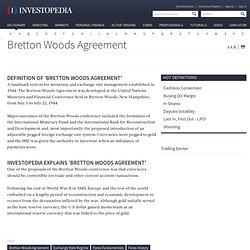
The Bretton Woods Agreement was developed at the United Nations Monetary and Financial Conference held in Bretton Woods, New Hampshire, from July 1 to July 22, 1944. Major outcomes of the Bretton Woods conference included the formation of the International Monetary Fund and the International Bank for Reconstruction and Development and, most importantly, the proposed introduction of an adjustable pegged foreign exchange rate system. Currencies were pegged to gold and the IMF was given the authority to intervene when an imbalance of payments arose. INVESTOPEDIA EXPLAINS 'Bretton Woods Agreement' Gold: The Other Currency. Throughout the ages, gold has captivated societies, and in a post-gold-standard world, many feel that with the instability that occurred in the first decade of the 21st century, some form of the gold standard should be brought back.
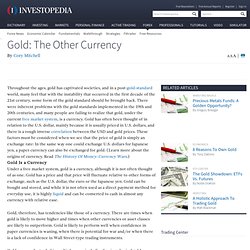
There were inherent problems with the gold standards implemented in the 19th and 20th centuries, and many people are failing to realize that gold, under the current free market system, is a currency. Gold has often been thought of in relation to the U.S. dollar, mainly because it is usually priced in U.S. dollars, and there is a rough inverse correlation between the USD and gold prices. These factors must be considered when we see that the price of gold is simply an exchange rate: In the same way one could exchange U.S. dollars for Japanese yen, a paper currency can also be exchanged for gold. Speculation Definition. DEFINITION of 'Speculation' The act of trading in an asset, or conducting a financial transaction, that has a significant risk of losing most or all of the initial outlay, in expectation of a substantial gain.
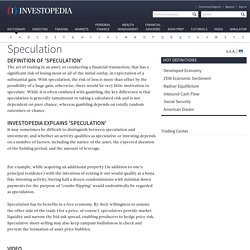
With speculation, the risk of loss is more than offset by the possibility of a huge gain; otherwise, there would be very little motivation to speculate. While it is often confused with gambling, the key difference is that speculation is generally tantamount to taking a calculated risk and is not dependent on pure chance, whereas gambling depends on totally random outcomes or chance. INVESTOPEDIA EXPLAINS 'Speculation' It may sometimes be difficult to distinguish between speculation and investment, and whether an activity qualifies as speculative or investing depends on a number of factors, including the nature of the asset, the expected duration of the holding period, and the amount of leverage.
Standard & Poor's 500 Index (S&P 500) Definition. DEFINITION of 'Standard & Poor's 500 Index - S&P 500' An index of 500 stocks chosen for market size, liquidity and industry grouping, among other factors.
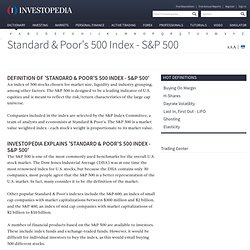
The S&P 500 is designed to be a leading indicator of U.S. equities and is meant to reflect the risk/return characteristics of the large cap universe. Rally Definition. Gold & Silver: Protection Against the Fed's Punch Bowl. The third quarter proved to be a very strong period for precious metals.
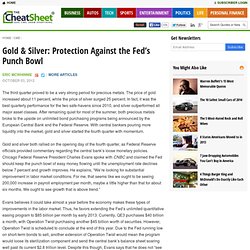
The price of gold increased about 11 percent, while the price of silver surged 25 percent. In fact, it was the best quarterly performance for the two safe-havens since 2010, and silver outperformed all major asset classes. Rigged Gold Price Distorts Perception of Economic Reality. The Federal Reserve and its bullion bank agents (JP Morgan, Scotia, and HSBC) have been using naked short-selling to drive down the price of gold since September 2011.
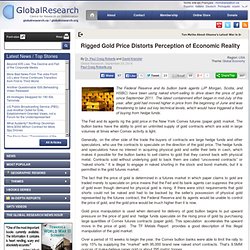
The latest containment effort began in mid-July of this year, after gold had moved higher in price from the beginning of June and was threatening to take out key technical levels, which would have triggered a flood of buying from hedge funds. Why has the price of gold risen 300%? It has never been easy to have a rational conversation about the value of gold.
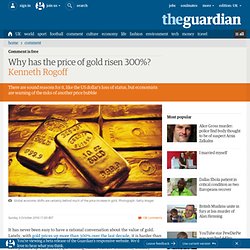
Lately, with gold prices up more than 300% over the last decade, it is harder than ever. Just last December fellow economists Martin Feldstein and Nouriel Roubini each penned op-eds bravely questioning bullish market sentiment, sensibly pointing out gold's risks. Wouldn't you know it? Why Gold Prices Keep Rising. The Real Reason Why Gold Prices are Rising [CHARTS] Conventional wisdom says the main reason why gold prices are rising is the loose monetary policy out of the developed world and a loss of faith in fiat currencies like the U.S. dollar.
![The Real Reason Why Gold Prices are Rising [CHARTS]](http://cdn.pearltrees.com/s/pic/th/reason-prices-rising-charts-93546486)
While loose monetary policy does contribute to higher gold prices, a bigger factor is at work, according to Amit Bhartia and Matt Seto of GMO LLC. Seto and Bhartia think that since around 1999, the huge gold rally has largely been on the back of surging demand from emerging market consumers. Consider the chart below, which shows that gold has not strongly tracked changes in U.S. inflation and inflation expectations since around 1999.
Gold prices are, however, nicely correlated with the Emerging Asia's share of global gold demand. From 2000 to 2010, retail purchases from emerging market consumers accounted for 79 percent of total global gold demand. Several factors explain this surge of gold purchases from emerging market consumers. So what does this mean for gold prices going forward? Gold prices rise more than 100 percent since 2008 : The Economics Daily. Will Gold Prices Rise in 2013? Will gold prices rise in 2013, or will the bear market continue in the second half of the year?
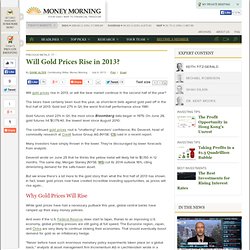
The bears have certainly been loud this year, as short-term bets against gold paid off in the first half of 2013. Gold lost 27% in Q1, the worst first-half performance since 1981. Gold futures shed 23% in Q1, the most since Bloomberg data began in 1975. On June 28, gold futures hit $1,179.40, the lowest level since August 2010. The continued gold prices rout is "shattering" investors' confidence, Ric Deverell, head of commodity research at Credit Suisse Group AG (NYSE: CS) said in a recent report. Many investors have simply thrown in the towel. Deverell wrote on June 25 that he thinks the yellow metal will likely fall to $1,150 in 12 months.
5 Main Factors That Cause Gold's Value To Fluctuate. Price manipulation, limited supply, peer pressure buying, falling currencies and central bank buying are the top five factors analysts cite when discussing gold price movements.

But not all these theories hold up to closer scrutiny, as gold prices in 2010 continue to push higher. See the following article from The Street for more on this. Gold prices have risen 20% in 2010, closing Wednesday at $1,336.90 an ounce. Another round of quantitative easing from the Federal Reserve, global currency wars led by the "race to debase," and a weakening eurozone have triggered gold's recent surge, but those issues don't tell the whole story.
Interestingsaying. AMERICA IS FIGHTING TWO SIMILAR WARS AND MIGHT LOSE BOTH: New Japanese Attack may cause Disaster, say experts. Terrorists are waging war against the United States and the West, and are trying to obtain megaweapons from nuclear states such as Pakistan or North Korea. “We are also simultaneously fighting another war – call it World Currency War One – that might harm America far worse than terrorism,” says Craig R. Smith, a monetary expert frequently interviewed by Fox's Neil Cavuto and other major financial journalists. “Oddly, these two wars are similar in at least three ways,” says Smith. Federal Reserve Bank. Map of the twelve Federal Reserve Districts, with the twelves Federal Reserve Districts enumerated in black circles and the twelve Federal Reserve Banks marked as black squares. Branches within each district are marked as red circles. The Washington, D.C. headquarters is marked with a star enclosed in a black circle.
A Federal Reserve Bank is a regional bank of the Federal Reserve System, the central banking system of the United States. There are twelve in total, one for each of the twelve Federal Reserve Districts that were created by the Federal Reserve Act of 1913.[1] The banks are jointly responsible for implementing the monetary policy set forth by the Federal Open Market Committee, and are divided as follows: Some banks also possess branches, with the whole system being headquartered at the Eccles Building in Washington, D.C.